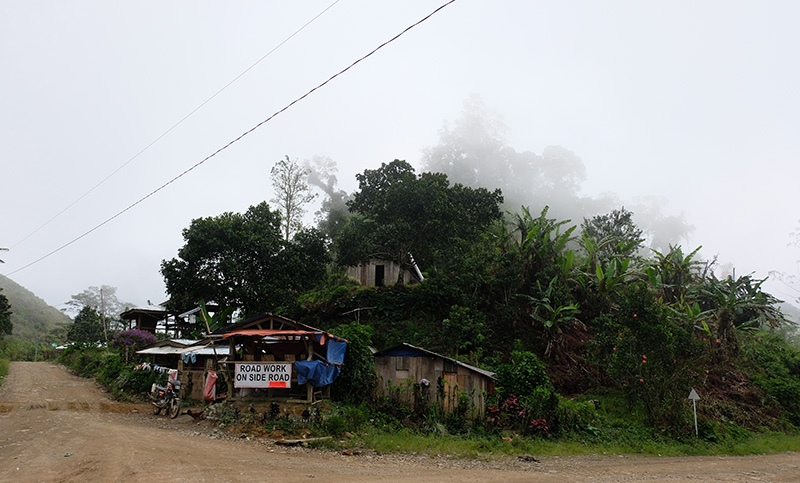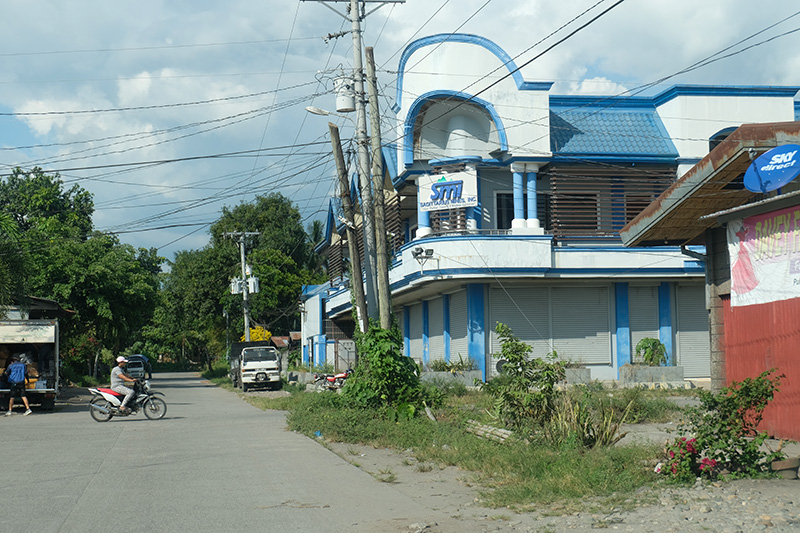KORONADAL CITY (MindaNews / 16 August) – A Catholic Church-led signature campaign to demand the retention of the controversial open-pit mining ban in South Cotabato was launched Monday, with organizers vowing to make mining an election issue for the sake of the environment, food security and for the future generations.
Diocese of Marbel Bishop Cerilo Casicas urged the parishioners, particularly the youth, to make the signature campaign viral as he stressed that areas without internet service will be reached through the Gagmay’ng Kristohanong Katilingban or Basic Christian Communities.
 Fog drapes over a community within the mines development site of Sagittarius Mines, Inc. in Tampakan, South Cotabato. MindaNews file photo by BONG S. SARMIENTO
Fog drapes over a community within the mines development site of Sagittarius Mines, Inc. in Tampakan, South Cotabato. MindaNews file photo by BONG S. SARMIENTO
“Definitely, the Diocese of Marbel will make mining and the environment an important issue during the coming elections. It will be part of the discernment in choosing the candidates,” the prelate said.
Casicas, however, noted that the diocese will have to collectively decide if the candidates will be singled out based on their position on the open-pit mining method, which the South Cotabato provincial government banned a decade ago through its Environment Code.
During the term of the late Marbel Bishop Dinualdo Gutierrez, a staunch anti-mining advocate and Casicas’ immediate predecessor, the diocese launched a campaign during the 2013 elections dubbed “Team Pabor-Team Ayaw,” which sought to educate local voters on the stand of candidates involving the $5.9 billion Tampakan project.
Sagittarius Mines Inc. (SMI) is the developer of the Tampakan project, touted as the largest known undeveloped copper and gold minefield in Southeast Asia, through a Financial and Technical Assistance Agreement (FTAA) granted by the national government.
SMI studies showed that the most viable way to extract the massive mineral deposits is through the open-pit mining method.
Casicas said they launched the signature campaign to retain the provincial ban on the open-pit mining method to protect nature and the integrity of creation.
The prelate noted that parishioners should sign the campaign on their own volition.
The signature campaign carries the slogan “Protect Nature, Protect Our Future.” The campaign materials have translated versions in English, Ilonggo, Cebuano, Blaan and T’boli.
“We demand that the Sanggunian Panlalawigan of South Cotabato stands firm in its duty to ensure the safety, convenience and well-being of its constituents,” it said.
“The provincial Environment Code and its provision that specifically bans open-pit mining must be upheld. This is the right thing to do and to ensure that the future generations inherit a better society enjoying the fruits of a sound environment,” it added.
The Iglesia Filipina Independiente, Alyansa Tigil Mina, Legal Rights and Natural Resources Center-Kasama sa Kalikasan and Philippine Misereor Partnership Inc., among others, supported the signature campaign.
Fr. Jerome Millan, the diocese’s Social Action Center director, said the 29 parishes in the diocesan territory would be at the forefront in encouraging the faithful to affix their signatures to the campaign.
“There will be a massive education awareness about why the open-pit mining ban must remain. They (parishioners) will be made to understand and not just sign the campaign for the sake of signing,” the priest said.
The diocese covers the entire South Cotabato and Sarangani provinces and parts of Sultan Kudarat, which are all Christian-dominated areas.
The Sangguniang Panlalawigan had started conducting consultations after the Indigenous Peoples Mandatory Representatives (IPMRs) from several towns in South Cotabato sought the lifting of the ban on open-pit mining. The IPMRs’ request was anchored on the economic contributions of the Tampakan project to the localities straddled by the venture.
Millan noted that lifting the provincial ban on open-pit mining method will open the doors for the Tampakan project to proceed to the commercial production phase.
“Let us not allow that. The Tampakan project is a big threat to food security and the environment in the area,” he added.
Roy Antonio, SMI corporate linkages manager, has yet to reply to requests for comments on the signature campaign launched by the Diocese of Marbel for the retention of the ban on open-pit mining method.
In October 2020, Judge Vicente Peña, acting presiding judge of Regional Trial Court 11th Judicial Region Branch 24, denied a petition by tribal councils supportive of SMI’s mining venture to revoke the open-pit mining ban in South Cotabato.
In a 31-page promulgation, Peña wrote that “the ban on open-pit mining in South Cotabato is not invalid, but rather legal and consistent with the Local Government Code of the Philippines and the Constitution.”
Touted as Southeast Asia’s largest known undeveloped copper and gold minefield, the Tampakan project has the potential to yield an average of 375,000 tons of copper and 360,000 ounces of gold in concentrate per annum in the 17-year-life of the mine.
 A motorist passes by the deserted office of Sagittarius Mines, Inc. in poblacion Tampakan, South Cotabato. The firm is now holding an office along the national highway in Polomolok, South Cotabato. MindaNews file photo by BONG S. SARMIENTO
A motorist passes by the deserted office of Sagittarius Mines, Inc. in poblacion Tampakan, South Cotabato. The firm is now holding an office along the national highway in Polomolok, South Cotabato. MindaNews file photo by BONG S. SARMIENTO
The environmental compliance certificate (ECC) granted to SMI was cancelled in 2017 by the late Environment Secretary Gina Lopez, after a review by her agency, because of the company’s alleged failure to comply with the conditions and permitting requirements set by the ECC.
The late environment secretary also banned the open-pit mining method.
The ECC of SMI, however, was reinstated by the Office of the President on May 6, 2019. Omar Saikol, Environmental Management Bureau – Region 12 director, revealed such development to reporters here in July 2020.
SMI also obtained an extension of its 25-year FTAA, which was to expire on March 21, 2020, for 12 years until March 21, 2032. The FTAA can be renewed for another 25 years.
The National Commission on Indigenous Peoples had granted the Tampakan project the certification precondition (CP).
CP is a certification that indigenous cultural communities (ICCs) have given their consent to the mining venture within their ancestral domain and that the Free, Prior and Informed Consent (FPIC) process has been satisfactorily complied with by the company.
Casicas said the Tampakan project “does not have the FPIC of the entire Blaan ICCs within the mines development site,” stressing the project will not bring genuine development in this part of the country.
The diocese has created the following link for the online signature drive: https://docs.google.com/forms/d/12FRUq2_urbZP42oBOzCOUT2FPrm0d3wupqe4IRLHvZ0/viewform?edit_requested=true (Bong S. Sarmiento / MindaNews)
